40th Anniversary Memories
First Retreat at Camp Onanda, March 1982. Thanks to Susan Schepp for the photo.
An invitation was sent with the March 2022 news update to share memories of the very early years of the Center (then called Genesee Valley Zen Center) when retreats were held at Camp Onanda on nearby Canandaigua Lake. Readers were also invited simply to share what was most meaningful about their times at the Center throughout the years. Responses received are here, but it’s not too late to send a memory or photo of your own to be included on this page.
Finding the Springwater Center land, autumn 1983
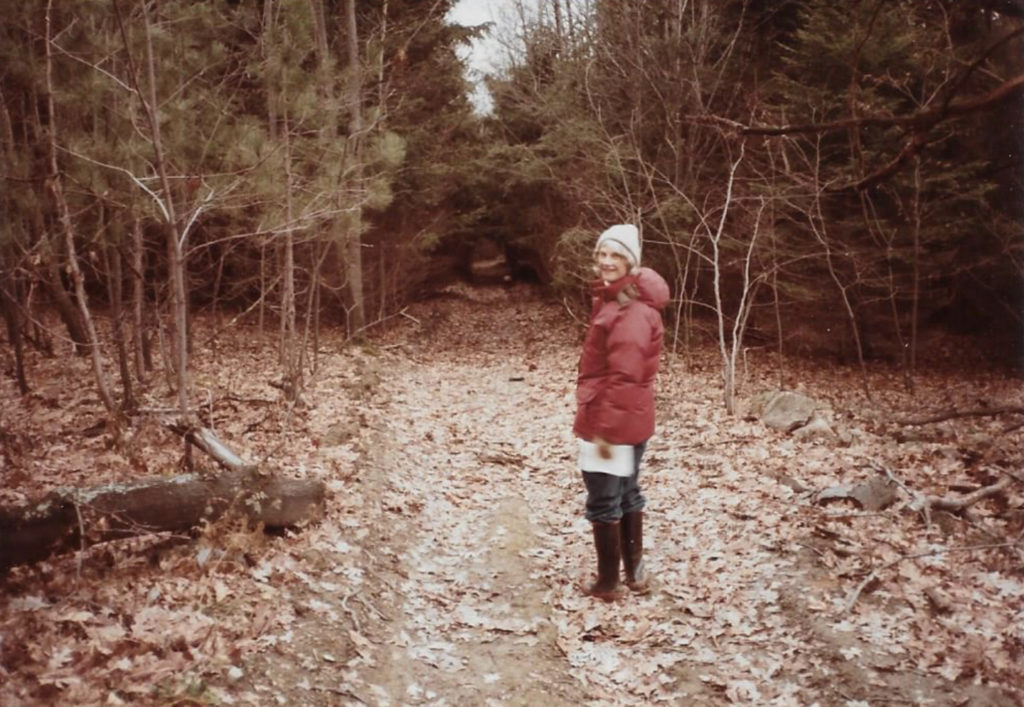
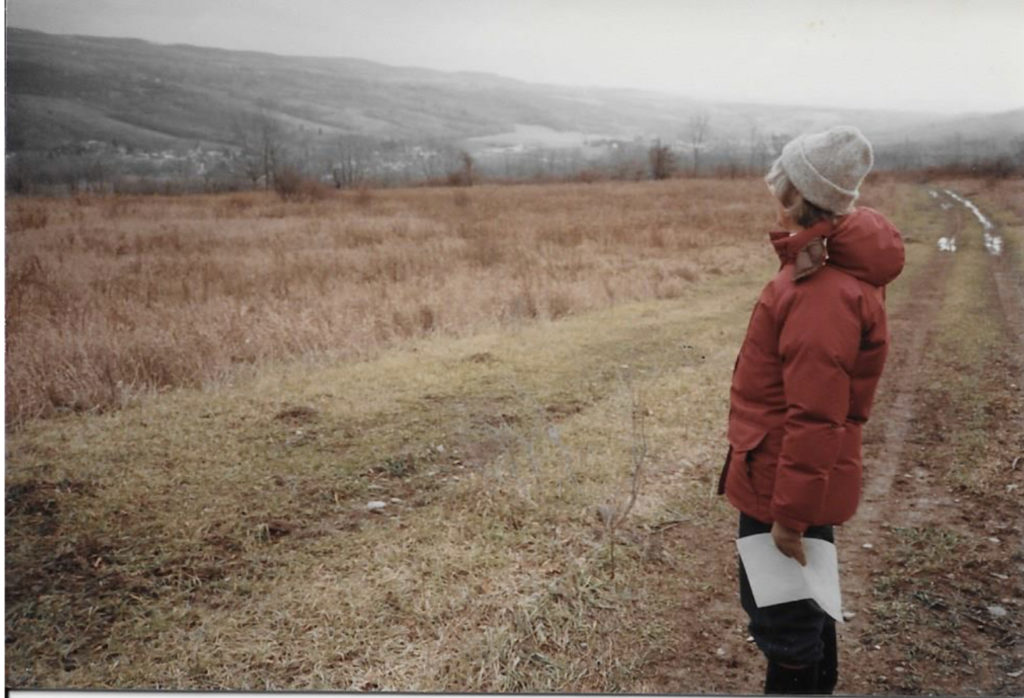
In April 1983, I left my job in Chicago and moved to Rochester to volunteer at the Genesee Valley Zen Center (predecessor to Springwater Center). That summer Toni asked me to take over the search for land in the countryside. At the time the criteria were that it be within 30 minutes drive of Rochester, that there be running water on the property, and that it not be near enough to a major highway to be noisy. At the time the community around Toni was quite close knit, so the hope was to be close enough to Rochester that people could come regularly. In early autumn I was fortunate to find such a property. We spent some time putting together a bid for the property. However, someone else outbid us.
We had to rethink our priorities. And so we moved the driving distance out to 45 minutes and resumed the search. But for quite awhile to no avail. Then in early spring I was contacted by a real estate agent in Lakeville who had a property he thought might work. Although it was slightly out of range, 48 to 50 minutes by car, it seemed worth a least a look. So I drove to his office in Lakeville. He showed me a map of this property in Springwater- it had a stream, large fields and an intact quonset hut. As he was going to drive, I agreed to look at it.
We drove down NY 15 and turned onto a dirt road that led to Marrowback road. After going up Marrowback a little ways, we turned onto an old rutted tractor trail that led past a ruined barn. We parked, and walked down a field to the creek. It was clearly the best place I’d seen.
So several days later Kevin Frank, the assistant administrator at the time, came down with me for a look. This time I drove my car up the same wretched tractor trail, and parked in the same place as before. We walked down to the creek and ate lunch just a little above where the culvert is today. Then we walked up through several fields. Kevin agreed with me that this place had promise.
Shortly thereafter, Toni, Kyle and virtually the entire staff came down for a look. I was trying to break in a new pair of boots and as we walked up the hill from the creek, Toni and Kyle looked at each other and Toni said this is the place. And about the same time I realized I’d finally broken in the boots.
Sam Nelson
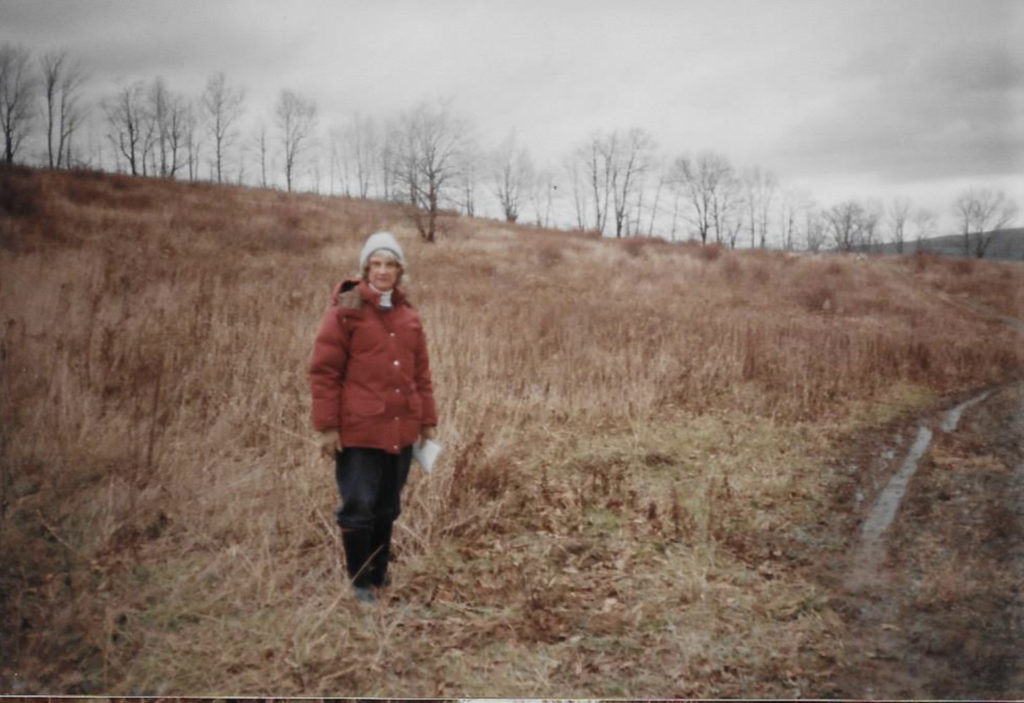
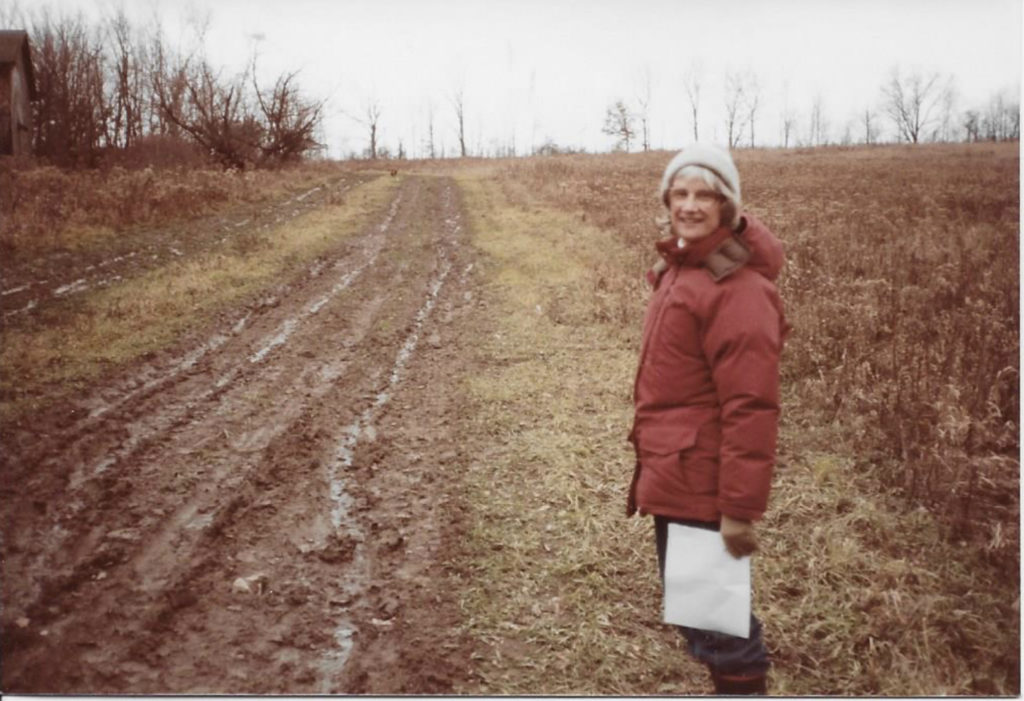
From Magdi Badawy
I met Toni at her last retreat at the RZC. Although I had attended many retreats at the RZC, none of them were with Toni. In our first dokusan, she invited me to ‘attend’ to whatever is arising without exerting any effort. The entire retreat was a spacious ‘attending without knowing’. Although I was not looking for a teacher, I immediately knew upon our first meeting that I had found in Toni my guide and teacher.
Followed many retreats at Mt Hope, Camp Onanda at Canandaigua Lake and then Springwater Center (the old Genesee Valley Center).
Walking the trails during retreats, meeting Toni along the path. What can one say? Everything was said without a word being uttered. Listening to her talks and being immediately transported into the vibrant silence, the deep stillness, not knowing. The words were like flying carpets which transported me into the vastness of presence.
How much Toni loved nature and how beautifully she spoke of her walks in the woods, the sky, the clouds, the kaw kaw of the crows. Walking the kin yin line. The knots of the beautiful wood floor. Sipping tea at night with friends in the dining room. Sitting on the couch in the sun room. Such beautiful views of the fields and distant trees. Yes, the famous uncontrollable laughter in the sitting room at camp Onanda late at night. And the MU shattering barking dog. There are no words that can describe the indescribable.
Helping in the kitchen prepping for mealtime. Peeling hard boiled eggs, dicing tomatoes. Cast iron skillets and pots of soup careful taken out of the oven just before the mealtime bell. A harmonious dance, a seamless flow of one. Walking in the snow, the crunch of the boots on the snow. Coming upon a group of deer in the upper meadow. What words can fully express this magical presence? The wonder of being at Springwater, so transformative.
I remember taking my kids Chloe and Julian to Springwater for the picnic. They were around 8 and 11 years old. Chloe decided to put together a talent show whereby she danced in the sitting room. Everyone seemed to enjoy the playful innocence of youth. And then Stew played the guitar.
Maybe some of you remember the sauna and the cold tub in the lower level bathroom. It was so much fun as long as it lasted. Many friends at Springwater have deeply touched my heart and taught me so much by their loving presence and their love for the work going on at Springwater.
It’s been many years now. Springwater will never leave me. I remember hugging Toni and feeling that I was hugging myself. So many ways Toni taught me. I recall as we parted, during a retreat group meeting, she told me that my path may be in a different direction than Springwater. She shared that I did not need to latch onto her. At least that is what I heard. I moved on but never moved away from the path. At some point, the path no longer leaves you. You and the path become one. Toni never ceased to help.
I am grateful to all the friends I met during this ongoing journey. I am deeply grateful to Toni. My journey, our journey goes on. Toni, Springwater and all the friends are always with me.
Deeply grateful.🙏💝
Magdi
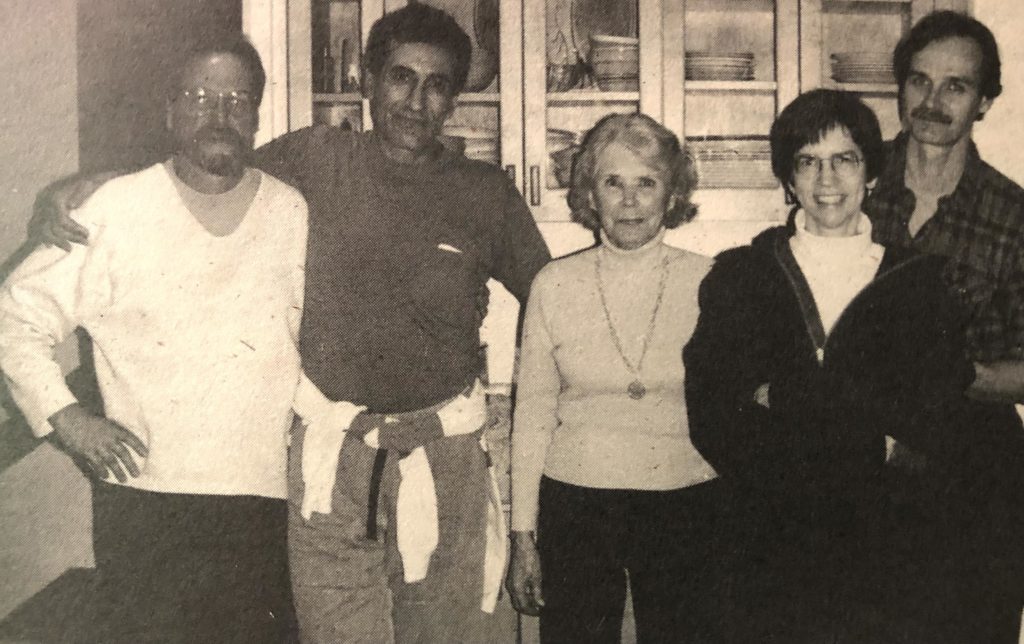
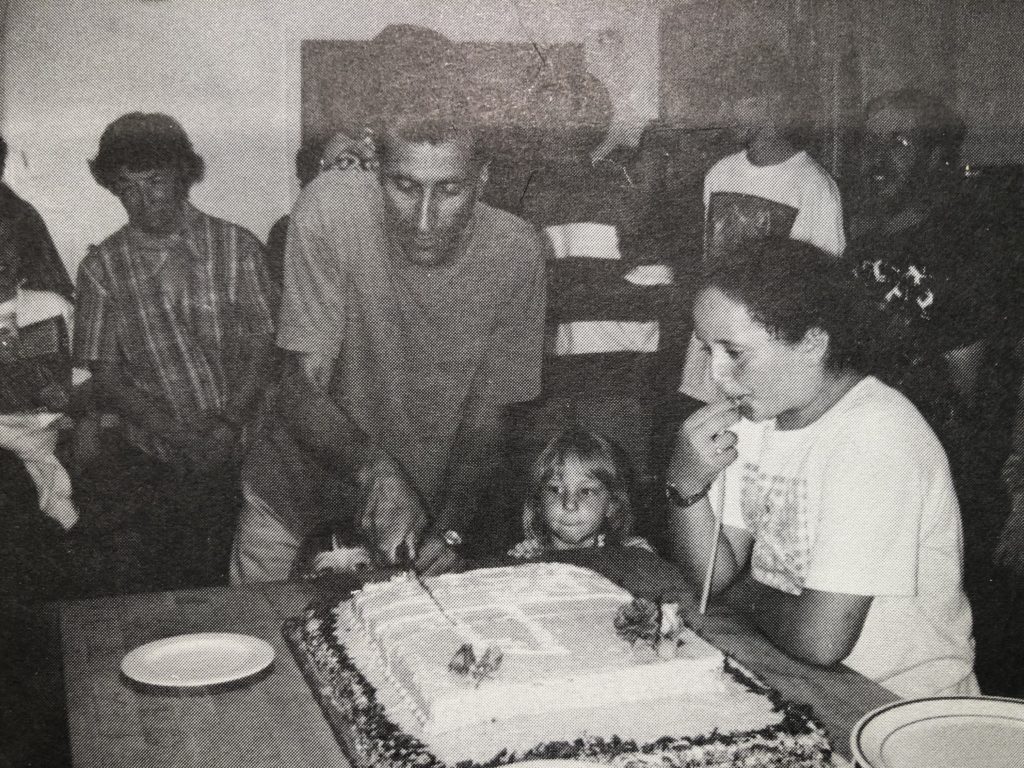
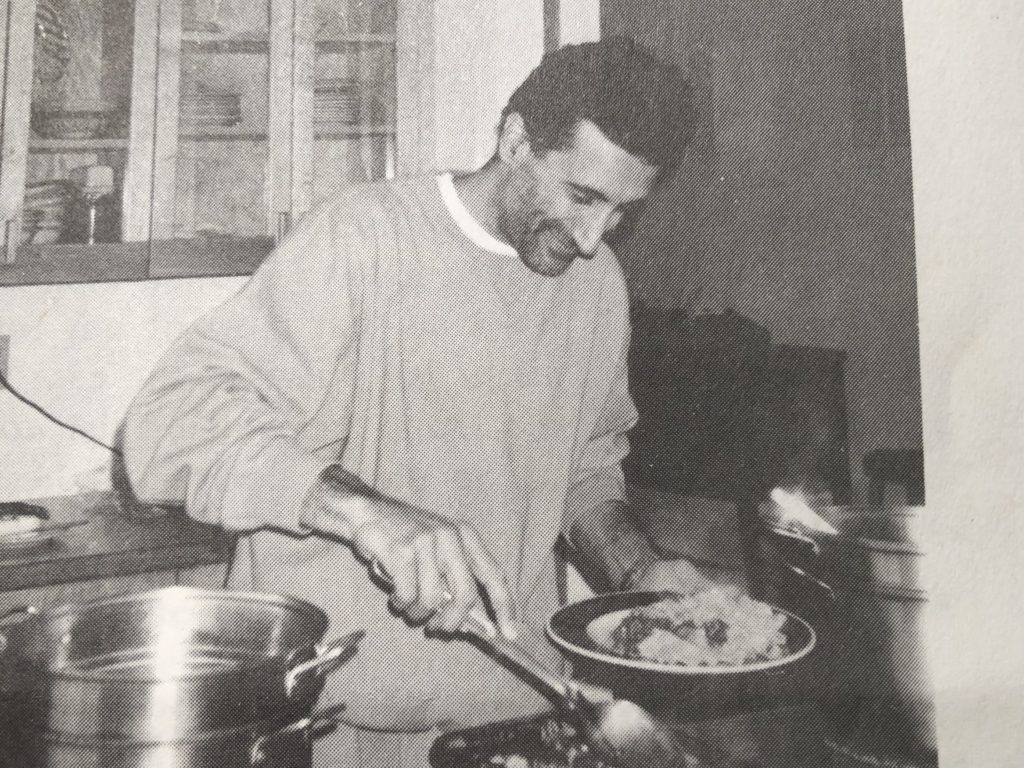
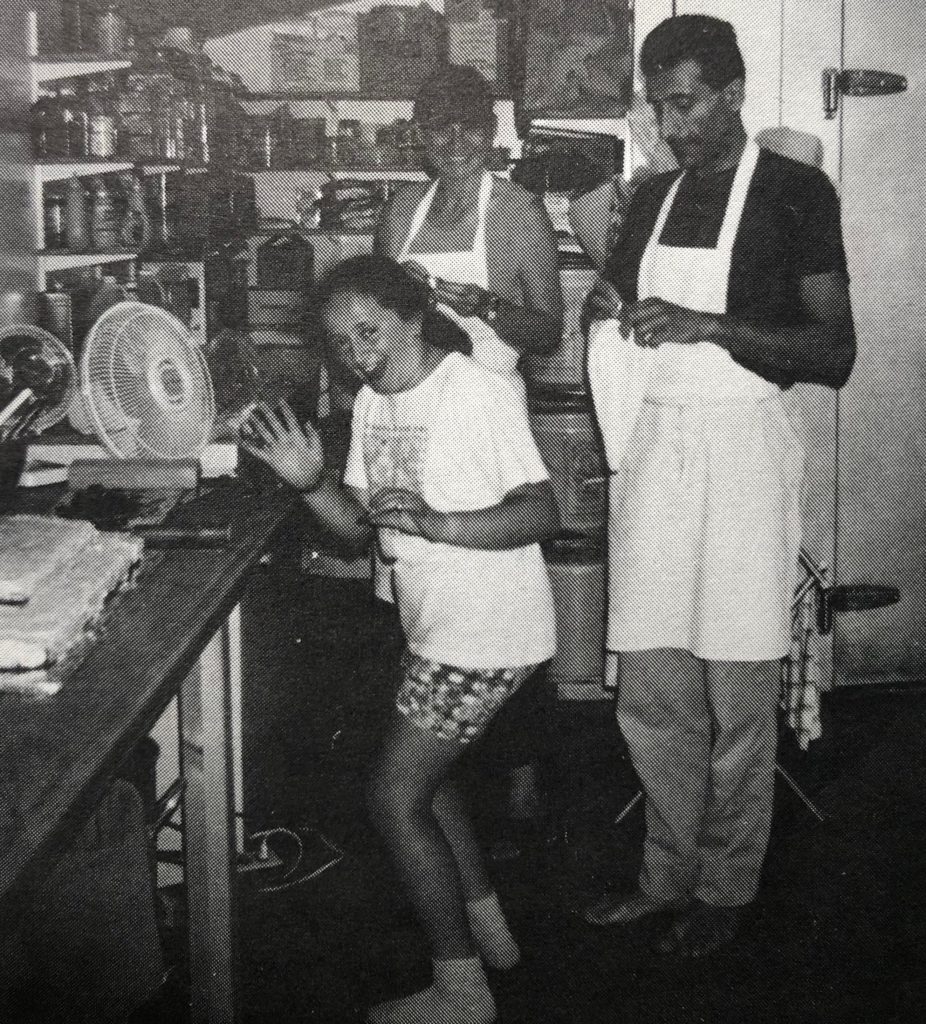
From Peter MacLachlan
Memories of Times Past
It has taken a while to put pen to page… I find memory is a bowl of soup these days, full of colour and flavour but, well, a soup… and memory, it seems to me, is a jumble of moments that exist outside of time, but moments that can somehow encapsulate some essence of those times now gone…
I remember the first time Toni came to Toronto, when I was still trying to be a Zen guy… she seemed very much a part of the RZC tradition back then… and I can’t say I had any sense then of where she would end up going, or the impact she would have on my life…
I certainly remember my first retreat with her, of being in an interview and feeling a sense of freedom in the process… How different sitting became after that and how it completely changed when the split took place… the split seemed to give me permission to throw away the manual…. though, even then, I would never have guessed I would end up living in Springwater.
There are images of Onanda: Skipping stones by the lake, Toni opening a window in the meeting cabin and all the world somehow spilling in, making bread in the vast kitchen, the wind in the trees, the creaky beds…
And certainly the building project: the first days of felling trees, of back and forth to Rochester… then the tent platforms (mine looking out over the valley)… the quonset hut kitchen where I cooked… the long work days, the tiredness at the end of them, the rough and ready nature of life in those times.
Moving into the unfinished building (there was snow on the ground, I’d moved my tent into the quonset hut, but it was pretty cold), my room had a gravel floor and a sheet of plastic on the window frame… my cat, Thomas, seemed happy enough though…
The new kitchen was set-up in the shower area, but I didn’t need to rake the floor anymore, sweeping sufficed very well… And finally moving up to the real kitchen, a fully functional stove and what a view… Wow!
After cooking too many meals for too many people I then helped finish the electrical wiring, the three way switch being my greatest challenge… it was a nice change and a good transition to my last job and greatest joy – being the receptionist…
What a wonder filled journey from an empty field to a fully functioning retreat center… And finally, after ten years, it was time to leave…it was hard but it was time…
Now I can look back with gratitude, love, and yes some bewilderment, at it all… but I wouldn’t change any of it really, except perhaps the inevitable misunderstandings that arise in the journey of our lives… but we can’t change what has been only honour the inevitable messiness of living.
Without my time there my heart would certainly not be as loving and wise as the poor thing can sometimes be… And my mind may never have come to understand (if somewhat imperfectly) the simple truth that life can only be lived fully when the heart is willing to let go of everything except love and curiosity…
I have so much gratitude for those wild and woolly times, of the wonderful folks I met, and those I got to know, and most especially for Toni…
Peter MacLachlan
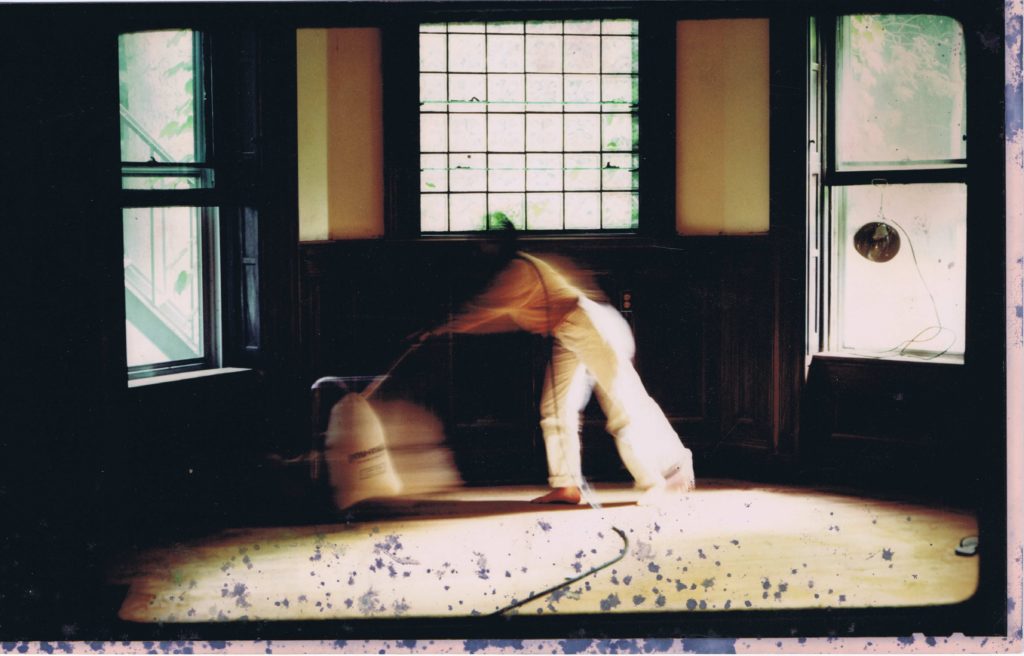
From Sally Fox [who was on staff when retreats at Onanda were happening]
The otherworldly sounds of ice breaking across the lake in spring.
Having to take life-saving classes so that people could swim in the lake.
Ferrying food, mats, cushions and all else needed for retreats down to the western side of the lake and into the campground.
It was still a setup that used the kyosaku and timed sittings. I vividly remember the first time I skipped a round of sitting to just wander along the lakeshore. A feeling of playing hookey, but also a feeling of unfurling to the world away from dictates and expectations. It was a beginning of expanding into inner and outer spaces that had been closed off.
We had to organise where Toni would stay (Wayside cabin), where meetings would happen, how the supplies for kitchen could be organised. There were delivery runs throughout the week, using the private vans of members.
The commercial kitchen and cold room were a delight for anyone who ran the kitchen.
The extraordinary Joyce Landau led the team who kept food flowing to both the retreats and the kitchen at Mt Hope, and then later to the massive build project to create the Springwater Centre. That team needs much more recognition.
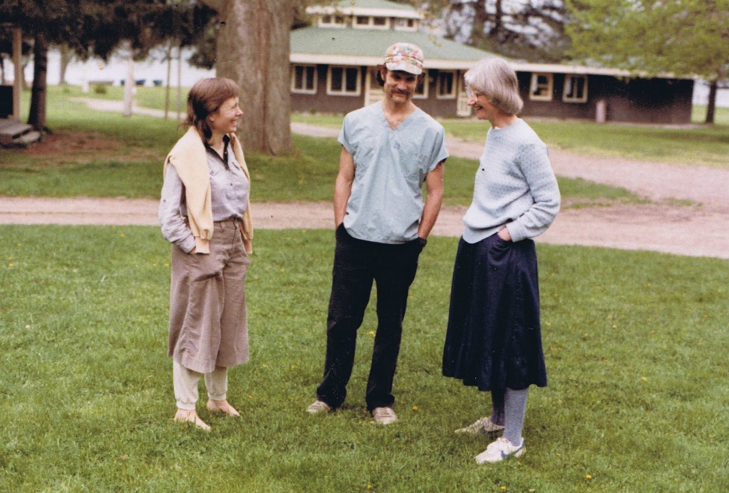
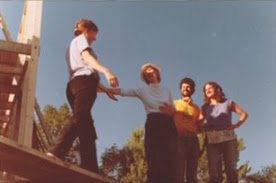
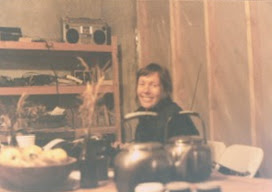
[Above photos provided by Sally Fox]
From Greg Wright
Hi Susan,
It seems ages since I’ve been to Springwater! If I can make it over this year, it will have been nearly three years since my last visit. I hope all is going well with you, and I’m looking forward to seeing everyone there before long. I do have some memories of the early days at the Genesee Valley Zen Center. Here are some of my recollections:
I had been a member of the Denver Zen Center, an affiliate of the Rochester Zen Center, in the 1970’s and early 1980’s. I always had more of an affinity with Toni Packer, though, than with other teachers at the Rochester Center. When Toni decided to start her own school and founded the Genesee Valley Center, I followed her immediately. It was a few years, though, before I attended a retreat at Camp Onanda. I think I attended three retreats there before the Springwater Center came into being.
The setting of Camp Onanda was stunning. It was set right on Lake Canandaigua, and the nearby mountains cascaded, almost vertically, into the Lake. The lodgings were slightly primitive with nearly everyone, as I remember it, sleeping in one long room filled with bunkbeds that was above the meditation area. It was difficult to sleep with the stirring, squeaking of the bunks, and the snoring, but we all tried our best to adapt.
In those days, the teaching environment still had a strong flavor of Zen Buddhism. Many of the members were working on the Koan “Mu”, which means “no”, or “nothingness”. They were supposed to concentrate intently on the Koan. When it came time for individual meetings with Toni, the students were expected to show their dedication to their practice by rushing up the nearby stairs as quickly as possible in an effort to become the first people to meet Toni.
At one point in a retreat, the bell rang, and half of the meditation hall stampeded across the floor and up the stairs, some bellowing “MU!” at the top of their voices. They then pounded down the overhead hall to the meeting room.
To the members still left in the mediation hall, this sounded like a heard of cattle being driven to market. Then entire hall erupted in laughter that continued for about ten minutes. Try as we might, we still couldn’t stop laughing.
I’m still amused when I look back on it nearly forty years later.
CAMP ONANDA RETREATS
Now forty years have passed
What do we see?
We call them memories —
Glimpses, mist-like
Islands scattered in the sea
Vivid and vague
Wooden cabins by a lake
That reaches far away
The air is cold
Sun glinting bright
We live this mystery day and night
Right here
Open
Never known
?
– Tom Nesbitt, 2022
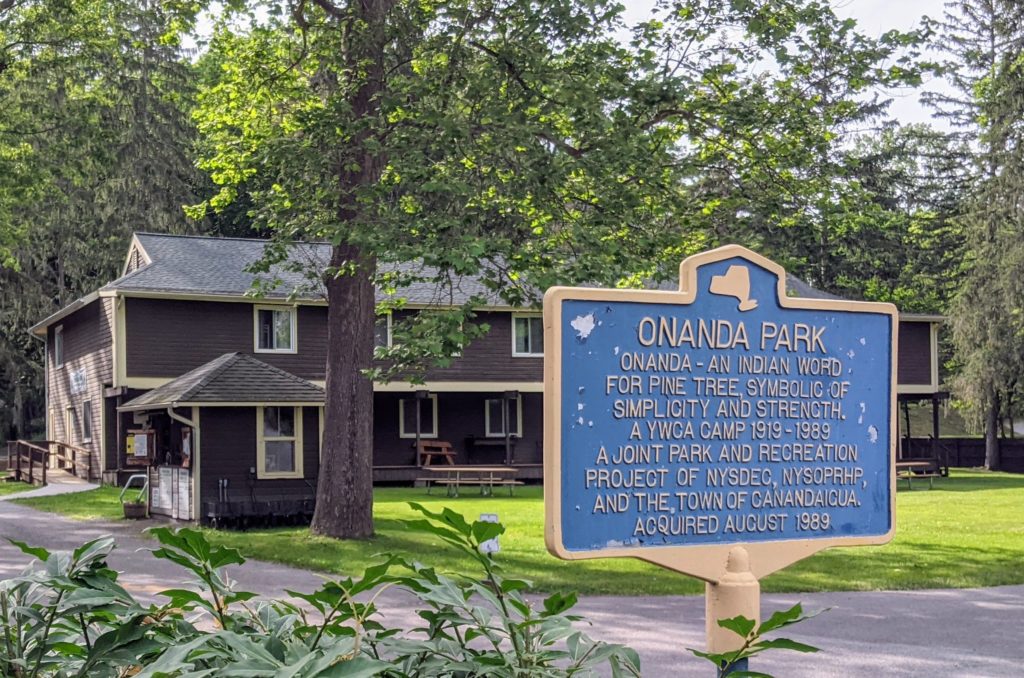
[Photo provided by Tom Beall-Schwab]
From Bryan Jones
Thanks for the opportunity to share memories from the middle 90’s when I would drive for 5 or 6 hours from New Jersey to attend several Saturday programs (and a 7 day silent retreat.)
It was at one of the weekend sittings that someone from the Rochester Zen Center posed the question, “What is the ‘I’?” I laughed out loud, causing Toni to ask me to clarify the reason for my amusement. I don’t recall my answer, but it was sufficient to reassure her that despite my laughter, I had taken the question seriously.
It was a pivotal moment, and a question I have pondered for the 25 years that have passed since, and in the process been rewarded by the realization that, as Toni so eloquently put it, “Truly seeing that the ‘me’ is nothing but a habitual mental construct is freeing beyond imagination.” The construct of ‘me’ doesn’t flee, of course, as the weight of conditioning is a formidable influence.
Still, awaring, and noticing the mind’s machinations, which feel, at times, like a kind of tyranny, often lead to “just this”: the crow’s ‘caw, caw,’ the wind’s changing tempo, the crunch of acorns underfoot, the rush of sensate experiences which seem to suddenly appear. (Wait a minute! Is this the “work of this moment”? I hope I got this right!……..Caw Caw) And so forth. You’re never done.
A few pixels of memory:
—a private meeting with Toni; her silence when I told her that I was “over” a personal issue.
—when staff cabins were still in the planning stages, playing flute with Stew Glick playing guitar in his room.
—sharing an evening meal, sitting around the kitchen table with staff and fellow attendees
—seeing a photo I had sent to Toni. It was hanging in the stairwell on my return to the Center, and I suddenly felt the fatigue from the long drive fall away from me.
As I approach my 78th year, I do so with these memories, but also with gratitude: for Toni and others who shared her vision and recognized the wisdom in meditative inquiry, free of the ceremony and the dogma inherent in conventional practices.
All the best
Bryan Jones
From Mike Stiler
Greetings,
It occurs to me, as I sit down to write this, that my Springwater experiences, over a span of 25 years of attending retreats and silent periods, feel like more than memories. In a way, even though I haven’t been back there in some years, Springwater is alive in me still. I can say this, back in ’86, when I stumbled into Springwater for an extended work/retreat period, my life was a total mess and going downhill by the day. Springwater and Toni Packer saved my life. It was there that I experienced some of the most difficult passages of my life as well as those of profound joy, and despite myself, discovered the greatest gift of all, that there is nothing to do and nothing to get. My gratitude to Springwater, to Toni, of course, the staff, the hills, woods and fields, the owls, crows, squirrels, snakes, foxes, grasshoppers, frogs, crickets, and the deep, deep, silence behind it all, is beyond words.
I have attached an essay from a book that I am hoping to publish soon, ‘Falling Into Beauty’, about the impact of awakening in everyday life, with a final chapter about a seminal Springwater retreat.
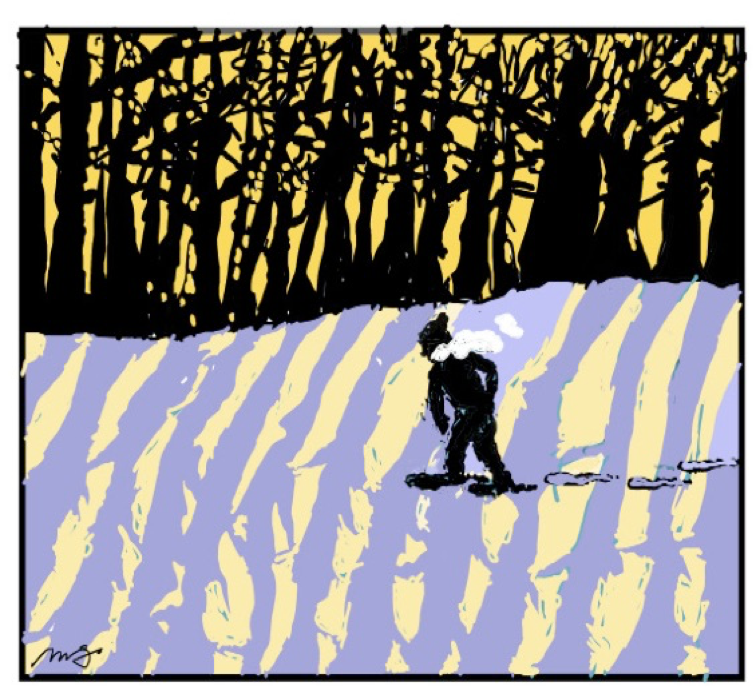
The Field
He followed the edge of the woods, moving against the grade of the sloping field, his snowshoes rising and falling as they broke the surface of the fresh, knee-deep powder. He took great pleasure in the give and take of the snow as though it were a living thing responding to his presence. The low, afternoon sun flickered through the hemlock and hickory like a strobe light as he made his way to the edge of the upper field where a line of old oaks made their stand.
He paused a moment, his breath billowing out in plumes, and listened to a single crow scolding from high atop the oaks. It had been a long while since his last visit here and he felt a welling up of affection, a mutual welcoming of the sparkling white fields, the woods, and distant hills. For many years, he had returned here, in all seasons, to wander and wonder with no agenda and no constraints of time. These fields and woods had become like old familiar friends to him.
As he stood and surveyed the scene, he recalled lying down in this same field, many years before, on a sun-steeped, late summer day. Over the course of that golden afternoon, he had passed the time gazing up at the clouds and sky through a parameter of sweet-smelling grasses and Queen Anne’s Lace. There had been a surrendering, a total and effortless listening to the hum of life, to the industry of bees and crickets, the piping wood thrush and ever-present ‘Caw! Caw! He remembered falling asleep there and waking with a shiver to find that Venus had replaced the sun in a darkening sky.
But now, returning to the present moment, he shivered again and shook off his reverie. He gathered himself and turned towards home, retracing his tracks across long, purple shadows. The hemlocks nodded and sighed as he passed and the air was permeated with fine, glistening crystals. He moved in an easy rhythm down the hill, and all sense of time fell away like snow off a branch. Once again, the field welcomed him into silence and he was alone with his breathing and the happy beating of his heart.
[Text and original artwork by Mike Stiler]
From Chris Woehr
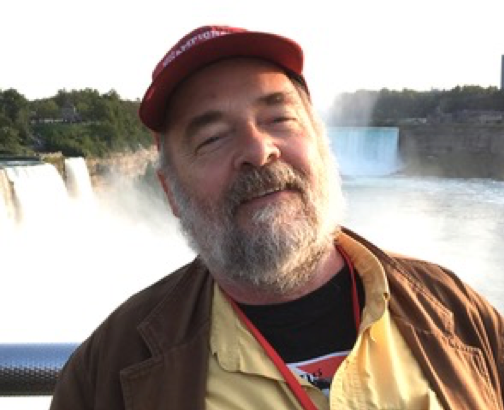
There was a park bench outside the sitting room, in the sun by a path to the lakeshore. Sitting on this bench after a dokuson, my lap was unexpectedly filled by a tiny kitten (who I believe was later adopted by our Australian member). It was the first time in my life I did not want or need anything, an experience so profound that it comes up even today as our cat Kahleesi crawls into my lap. I am so grateful for the peace and joy brought about with the help of the GVZC and Springwater and Toni Packer, the Rochester Zen Center, and Roshi Kapleau.
Does anyone remember the name of this kitten? I believe it was a euphemism for “trouble”.
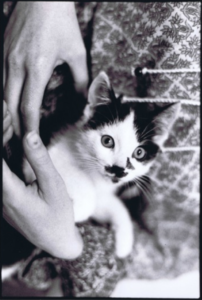
From Dan DeLorenzo
Thanks for posting the link to Toni’s talk from that first retreat. Wow! I forgot how energized she was in those days. So great to hear her bring those insights into Bankei’s writing.
I was fortunate to go to several retreats at Camp Onanda sponsored by the Genesee Valley Zen Center.
One strong memory is of sitting during the afternoon with a large group of retreatants, hearing the various sounds of passing cars, people in the distance by the lake, and then a barking dog. Somehow this particular barking touched a funny bone that started us meditators laughing. A few sporadic laughs at first with some effort to suppress it, but it was contagious and gradually the whole room resounded with spontaneous laughter. Several times laughter would die away only to be set off again by the dog barking. After quite some time even though the dog was not heard someone would chuckle and laughter would break out. Quite an interesting occurrence during a silent meditation retreat!
From Michael Peters
Living in Germany, I can’t come often but Toni and Springwater will forever be extremely important to me. So, sending much love.
I started working with Toni in 1975, sat with Dagmar Apel in Cologne, did a training program at the RZC in 1979, went to many or maybe all of Toni’s German short and long retreats, and came to Springwater in 1986 and 2007. My meditation cushion that I still use today has been with me all the time : )
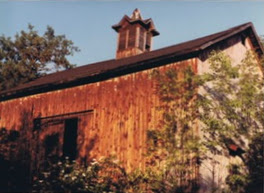
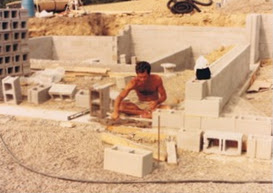
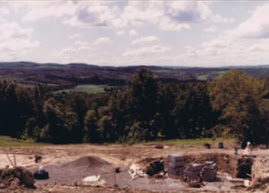
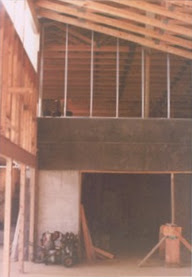
[Above photos provided by Sally Fox]
From Susan McCallum
I attended the second retreat held at YWCA Camp Onanda in April 1982. In the following years I attended as many retreats there as I could. I was in a transition phase of life at the time, having left a promising job in order to focus more on sitting, and retreats, a phase that ended with joining staff, meeting and marrying my husband Wayne Coger and spending more than 35 years closely associated with the Center and its founder, Toni Packer.
Camp Onanda and those early retreats were revelatory for me. Memories come of the sounds penetrating the sitting area that was set up in the Camp’s dining hall—neighboring cows lowing, the caretaker’s lawnmower roaring, a kitchen fan whirring, and, in the early autumn, the clicking of cicadas in the trees. Then there was Toni’s voice, giving short, eloquent encouragement talks, bringing us back to the present moment.
The accommodations were basic, with many of us staying in a barracks-like space of a row of bunkbeds. (Does anyone remember that the original plan for Springwater Center’s dorm rooms called for bunkbeds to be installed? Can you picture 8 people staying in room 10?)
The Onanda kitchen was great—a huge space, plentiful room to work with a big cold room and commercial stove and equipment. It too may have inspired some features of the Center’s kitchen today. Equipment was sparse in the first retreats. Tea, quite memorably, was served from a big soup pot with a ladle.
Early on, during the Onanda work periods, the staff were undertaking a fabulous project of sewing sitting mats and cushions. A memory comes of Joyce Landau smiling and easily carrying three of the heavy mats that she had made. The mats we sit on today were made by the staff those many years ago, though they now have blue covers rather than the original brown.
My memory of the staff of those days is of young energetic people working very hard to keep retreats happening, while also operating the Center from a rented house in Rochester, searching for country land to build on and then building the Springwater facility. Quantities of food and equipment had to be transported from the rented house on Mt. Hope Avenue in Rochester to Onanda. I remember Sally Fox once telling me that it took staff four days of work to set up the first retreat at Onanda, including, to be sure, placing a dark brown cloth over the Coca-Cola vending machine at the end of the dining room/sitting hall. But by the last retreat at the Camp, the routines had jelled to the point that it took only six hours.
Toni could be found holding meetings in various locations at the Camp. A friend observed that it was sure to be the warmest place in the winter and the coolest in summer. She slept and ate in a cabin located across a rocky stream, with an attendant bringing her meals. In later years, she dropped many of the perquisites that were a holdover from the Zen tradition. One day, taking a walk before an early autumn retreat began, I caught sight of her sitting, alone and looking out to the lake by the rocks of the dried up stream. Somehow I sensed she was dealing with great difficulties unknown to me and I backed away.
The location of the lineup of attendees wishing to meet with Toni varied. One retreat it ranged along the bunkbeds, in another it was in a small rustic cabin where mice ran up the wall at night. In one warm weather retreat, for the meeting group to reach the waiting line, it required a spirited leap off the porch of the dining hall building, followed by a race across the lawn where, in my memory, we lined up outdoors under the trees. In this retreat I had caught a glimpse of something. Getting up to move ahead in line I tripped and tumbled over—a whirl of trees and sky. Only after meeting with Toni did it dawn on me that no one had been there, no one had fallen, a whirl of trees and sky and that was all.
Onanda is still there—it’s now a park of the Town of Canandaigua. Visit it if you can and enjoy the lake and hiking trails on the hill looming up across the road. For me, its natural environment and bare-bones facilities were a cradle for all that came afterward.
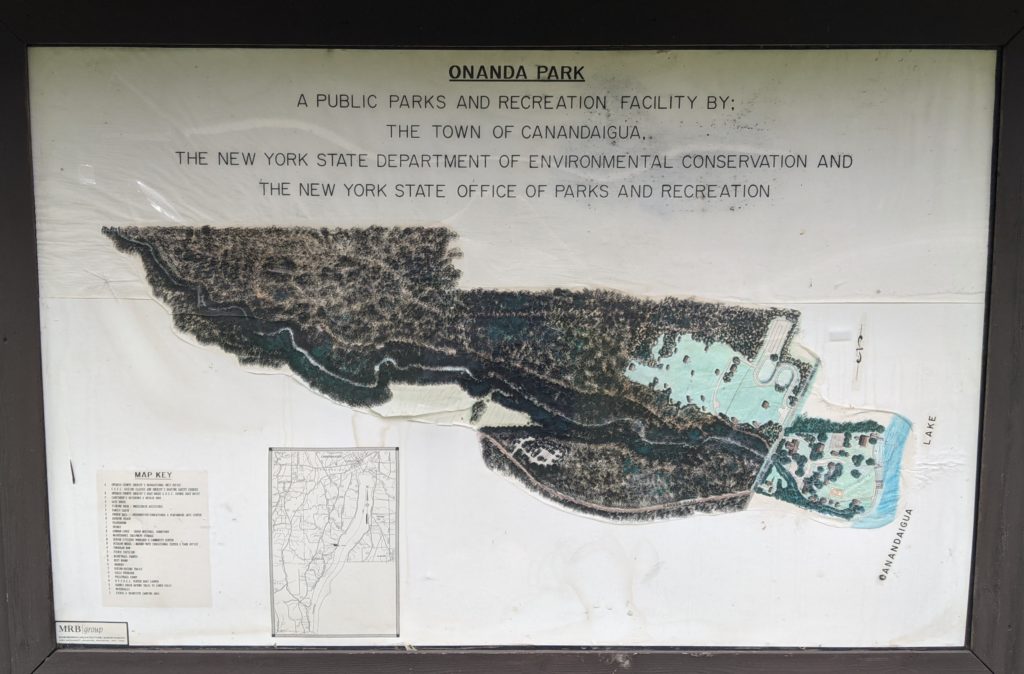
[Photo provided by Tom Beall-Schwab]
From Jacek Dobrowolski
IS THERE A MYTH OF THE SPRINGWATER CENTER?
In a talk during the 7-day retreat at Springwater Center in August 2005, that I had attended, Toni Packer had remarked that there is no Springwater Center myth. Well, there may be no myth of the Springwater Center propagated by its members but Springwater is such an excellent expression of life that it always evokes mythical and symbolic associations. The myth is contained in the name.
Water flowing from the bosom of mother earth is a wonder to behold. It is so alive, so pure, pristine and crystal clear. It flows and yet remains perennial. In Polish we say that a spring “beats” (bije) – just like the heart does. It’s one of the finest phenomena to behold and is an archetype of “eternal life”. A flame has similar qualities and is just as readily mythologized by the image spinning human mind but it does not last as long as flowing water. People like to gaze upon the face of the water or into a fire, don’t they? Later they try to enshrine the experience in poetic words or in works of art. Both running water, as well as lakes and ponds, are used as meditative objects and metaphors. Sometimes it’s the moon reflected in the lake, or raindrops ever so gently touching its surface, at at other times it is the vastness of the ocean. The Tibetans have a saying „Best water is rocky water“.
One may enjoy the serenity of the lake, specially when its frozen and when spring thaw comes the ice breaks and it comes to life gleaming in the sun. Also in springtime all the brooks and streams start running, dripping and dancing along. No one described it better than H. D. Thoreau in Walden or Life in the Woods.
Myths of sacred springs, or of springs of eternal youth, may be found in most mythologies, especially in a paradisical setting. A spring is always feminine in character symbolizing virginal qualities, innocence of the heart, intuitive wisdom, powers of healing, rejuvenation and immortality. Usually a nymph, or a faerie, presides over it as its personification in a divine form. Such a nymph may bathe in the spring of eternal youth to rejuvenate herself, a metaphor for the cleansing of the heart. This was a popular motif in Indo-European mythologies. During the Christian era the Virgin Mary took over the function of the spring protectress, though she was too prudish to take a dip in it like a naiad.
Poets often become inspired by a drink from divine spring waters. Hence Apollo’s Castallian spring in Delphi. I couldn’t resist taking a swig from it five decades ago and it still keeps me going. Sages taste the spring waters of wisdom in their hearts. Krishnamurti wrote, after his awakening under the pepper tree in Ojai, that he had drunk deep from the spring of wisdom.
Some took the fountain of youth legend literally. The Spanish conquestador Ponce de Leon, had been looking for the fountain of youth all over the Caribbean.
For Ponce de Leon Who Gave Florida its Name
He looked for the spring of immortality
killing Indians on the way
If only he would lose his greedy violent self
the spring would have gushed forth
An arrow put an end to his search
drawing a fountain of blood
Fair enough
In an e-mail sent to me in years ago Toni had written about the group meetings: “I don’t feel (back) pain when I’m totally bathed in this inexplicable creative energy”. Well, such is the healing power of Springwater Center’s fountain of wisdom that true faeries enjoy.
It is easy to see Toni as the Sybil of the Springwater Center, or the nymph of the pond above it where she liked to go for walks and where she took me for meditation on a bench to croak with the frogs.
When her marble statue as the Athena of Dansville will be erected in front of the town-hall, please don’t forget about the fountain at her feet for travellers and dogs alike to drink from.
